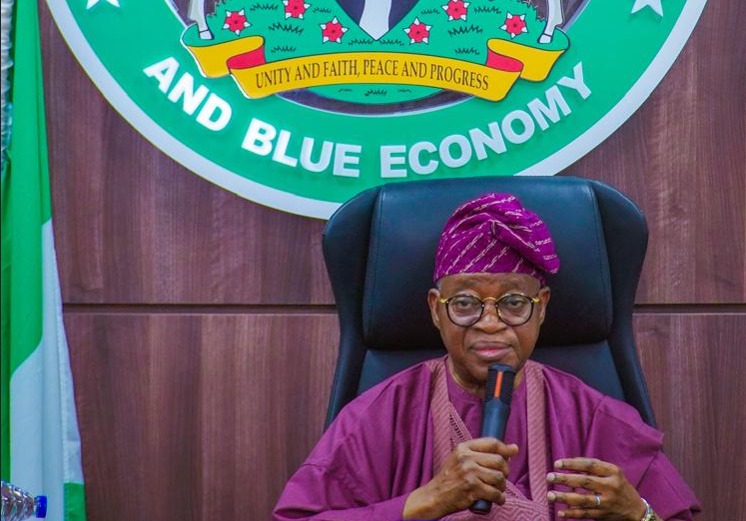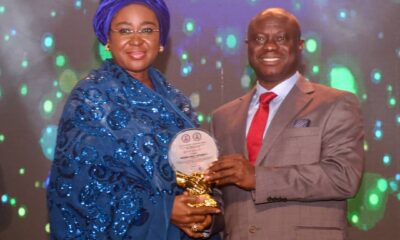Analysis
Q4 ‘25: Poor Start-Off Growth Outlook May Affect Nigeria’s Port Closing Performance

EDITORIAL COMMENTARY
If economic predictability is a function of planning and implementation, then there is little hope that the Nigerian port sector would achieve more as the year begins to gradually wind down, since ab nitio, there was no purposeful and compelling growth plans for the 2025 fiscal year.
It would appear that this government like the one it succeeded lack the discipline, competence and sense of duty to prioritize the performance of the economy through sector based growth projection; and may have neglected the port and maritime as the leading cash cow sector, second to crude oil.
Sadly, the reasons are not farfetched and all evidences to our dire strait point to one and only one factor, political rascality and official debauchery which were encouraged and promoted, albeit through our apparent, collective silence.
For instance, Nigerians were largely quiet when the 2025 national budget allocated zero funds for major seaports rehabilitation, leaving PPPs as the only lifeline for modernization. It is appaling that total allocation to the port sector though the federal ministry of marine and blue economy was ₦38.33 billion.
No allocation was provided for the rehabilitation of major sea ports, namely Apapa, Tin Can, Onne, Warri and Calabar. There was also no budget for the proposed new Deep Seaport projects (Badagry, Snake Island, Burutu, Ondo); neither was funding earmarked for critical port modernisation programme.
While ₦10 million was allocated for the Cabotage Act Implementation & Vessel Financing Fund (CVFF), ₦21.8 million was allocated for Dry Ports Construction (Ijebu-Ode & Moniya), ₦1.09 billion for Fish Terminal & Harbour Development, with ₦1.5 billion allocated for Waterways Construction/Provision, and ₦6.4 billion allocated for the Regional Maritime Development Bank.
This is despite strident calls for the rehabilitation of aging port infrastructure, especially Tin Can and Apapa (which together handles 70% of Nigeria’s imports).
Perhaps, it is only in Nigeria that the political class inclusive of the parliament and MDAs (policy and law makers) engages in proactive budget designs and allocations that caters significantly for their immediate welfare and needs.
In this wise, they undertakes urgent, extra budgetary sessions to make supplementary fixes for themselves, while they care less about the citizens and national assets, infrastructure and the national economy.
With a huge dose of arrogance they impudently declare in public, they did not get into office to showcase poverty, while the system gets poorer under such criminal mindset and suffers progressive deterioration made worse by lack of moral evaluation, vaulting incompetence, corrupt and myopic outlook.

Thus the nation’s port economy was not spared of their sickening disregard for values as these popinjays, greedy felons and gluttons appropriated a paltry N38.33 billion only for the development of the port and maritime sector in the 2025 budget.
As we enter the last quarter of 2025, the port industry’s growth trajectory is thus being shaped more by private sector resilience and regional competition than by federal investment.
Findings have shown that cargo handling services are growing modestly, driven by private terminal operators and oil-related imports, while vessel leasing and rental services is just above board, especially in offshore support for oil and gas.
Other supporting services (e.g., towage, pilotage) are expanding, but constrained by outdated port infrastructure; while Abuja loves to lay claim to Nigeria as the sub region’s cargo transshipment hub.
The truth is that Nigeria is not only currently behind in regional port trade competition, our curious indifference and inefficiencies has continued to promote cargo traffic diversion; and aiding massive smuggling across our land borders that appears well oiled and controlled by well known cartels that are untouchable.
While Ghana and Togo ports are pulling ahead with deeper drafts and faster clearance time frames, Nigeria’s shallow ports and red tape are pushing shippers to reroute cargo, costing Nigeria billions in lost trade.
Even Nigerian’s potential in the African Continental free Trade Area (AfCFTA) remains largely untapped despite that we can lead intra-African maritime trade. Through our inertia which has resulted into broken, inefficient ports, Nigeria risks becoming a transit backwater unless we improve on all fronts and make the 2026 budget, one of purpose and vision, deliberately designed to grow the port system as a critical nexus to the national economy; and not one driven by empty, political rhetoric.
Nigeria needs more cost efficient ports, this we can achieve by improving the channels and increasing their draft from 12–13m and 16–17m as the case may be for Lagos ports, Onne, Calabar and Warri, respectively, that would allow mega vessels to dock, which will help to cut shipping costs by up to 20%.
We need to continue to improve on ongoing automation of our port operation and ensure that the National Single Window project does not end up a farce. There is also the urgent need to build on the efficiency of customs modernization management systems codenamed B’Odogwu, which has the capacity to ramp up service delivery and trade facilitation.
Unless this government takes a more purposeful step in infrastructure investment, repairs and maintenance, provide stricter regulations for warehousing and get serious with a functional intermodal transport system, Nigeria risks falling behind in global and regional trade.
To achieve the above however, those concerned must improve on our budgeting system, while Nigerians should be more outspoken about criminal official elements that skew budget planning and implementation for narrow purposes while constraining the growth of the national economy.
The Presidency, Nigerian Senate, House of Representatives, Ministries, Departments and Agencies, State Goverments and NGOs should become more discerning and improve on the collective resolve to raise the patriotic credentials required to make the national economy more functional and competitive.






























